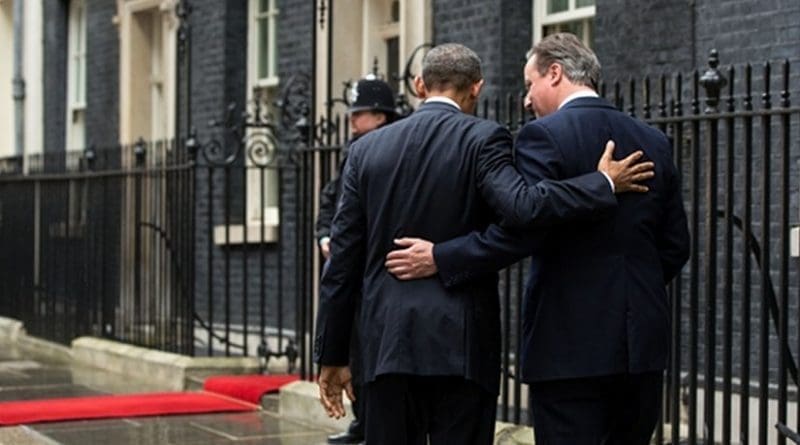Who Is Special Now? The Mythology Behind The US-British Relationship – OpEd
To any historian buff, it should be a known fact that Britain’s “special relationship” with Washington has been a tough one, subjected to periods of bruising and disagreement. States caught in a web of imperial domination can only be special to a certain extent.
Despite this, the mythology of a special relationship between London and Washington continues to sound its tunes. That sense of closeness has been as much a cultural as political one. Together, Anglo-Saxons would triumph on a global scale in a messianic, racially adorned mission twittering about a liberal democratic order.
While the US Republic was perceived as founded upon a radical revolution, loyalist ties ran deep with the British empire. The strain of Anglo-Saxon bonding persisted. Joseph Galloway, a figure of prominence at the Continental Congress in 1774, would eventually break with the leaders in favour of the loyalist cause. Fleeing for Britain after being deemed by the Pennsylvania Assembly in 1778 a traitor, Galloway nursed fantasies of reunion, with Parliament assuming its role as sagacious mother and governor.
The flirtation with re-union persisted even as Britain increased its possessions. Writing in 1902, British journalist William Steadman considered the links in the unmistakably titled The Americanization of the World. “The lion’s share of the world is ours, not only in its bulk, but in tit-bits also.” This smug observation tended to ignore that large German speaking population within the US, the implications of that which would come out in the early part of the First World War.
While President Woodrow Wilson did eventually enter on the side of the Allies in 1917, aspirations to make the world safe for democracy proved troubling to the victorious imperial powers. An articulated right to self-determination was particularly problematic. The days of British Empire were numbered.
With the advent of the League of Nations, an organisation which refused to receive domestic American support, the US went into something of a slumber, hoping to avoid unnecessary entanglements through the 1920s and 1930s. (To this day, the myth persists that the US was entirely insular or even isolationist during this period.)
As the Second World War raged, the close relationship of Prime Minister Winston Churchill, and that of President Franklin D. Roosevelt, did pay dividends. The 1942 Lend-Lease agreement was one such manifestation of this association. But the good will forged in war would not last in peace.
President Harry S. Truman was in little mood to be charitable, demanding British repayments in 1945 and rebuffing advances for new loans for reconstruction. The debt was subsequently reduced, and Congressional approval forthcoming for a loan amounting to half what was approved. (Churchill, now in opposition, had procured his begging bowl to convince Congress.[1])
The international order was transformed with the Bretton Woods institutions, much to the chagrin of Britain’s planners. The anti-colonial, open market agenda came across as another rich slap to the protectionist enclaves of empire.
Despite being in ruin, and a former enemy, Germany, at least its western part, became part of a US project of European finance and integration. Strategists were already banking on a revived German economy, with an industrial capacity superior to that of a crippled Britain. The European Coal and Steel Community had Washington’s blessing, while a snobbish Britain remained obsessed with its declining empire.
As Columbia University emeritus professor Volker R. Berghahn has observed, Germany may have failed on two occasions to attain primacy on the continent with military force but gained “hegemony in Europe without firing a single shot” after 1945, in no small part due to its relationship with the US.[2]
More rebuffs to Britain would follow from the bullish power across the Atlantic. Britain got a firm scolding from President Dwight D. Eisenhower for its Suez adventure against Gamal Abdel Nasser in 1956. During the next decade, Britain dug in its heels regarding the failed US engagement in Indo-China, refusing to deploy personnel to Washington’s own version of a bloody colonial adventure.
Be it a “special relationship” or an Anglo-American union, such ideas have bound the countries on both sides of the Atlantic, not always to the good. The fact that Britain has been a particularly noisy cheer leader for Washington’s interests during the post-Cold War world, be it in Europe or on the UN Security Council, could hardly have been surprising in its familial sense.
Much of it seemed to be an act of contrition for having gotten it wrong about the re-unification of Germany, which President George H.W. Bush backed; and Prime Minister Margaret Thatcher’s continuous opposition to the European Economic Community.
Subsequent pro-US engagements made less sense politically. Under Prime Minister Tony Blair, this entailed unwarranted evangelical missions from 2003 into traditional areas of European and Western interference with calamitous outcomes. The Blairite mission in the Middle East was miserably characterised by obsequious endeavour. Instead of being a firm critic of US imperial bullying, Britain became a co-sponsoring companion.
With the Brexit vote, President Barack Obama’s reassurances that Britain remains one of the chosen has to be seen in the context of a mythology that produced it. Washington’s interests are as much, if not more tied, to such states as Germany, the European continent’s business motor. The fantasy of an Anglophone sphere of interests, typified by Boris Johnson’s school of thinking, is bound to persist. The economic realities will lie elsewhere.
Notes:
[1] https://ore.exeter.ac.uk/repository/

